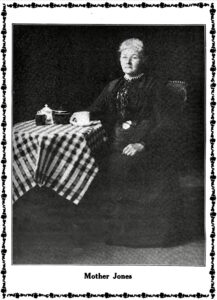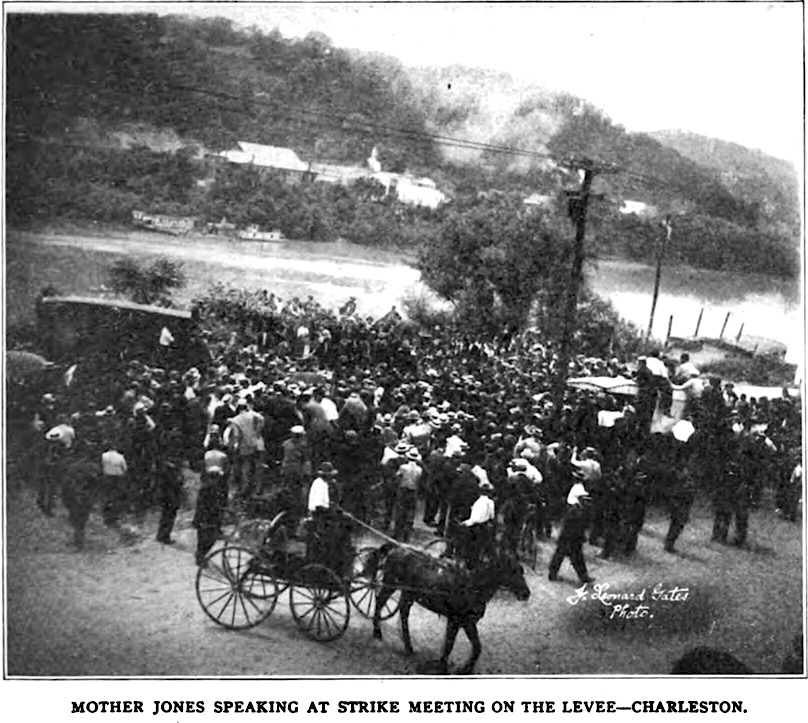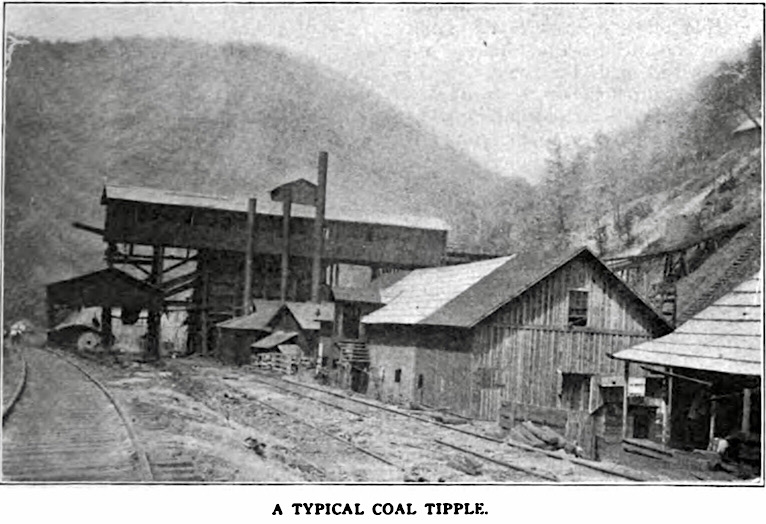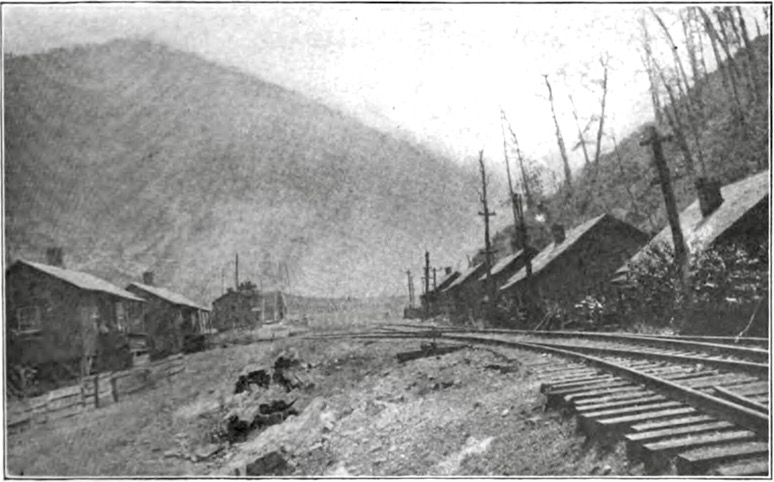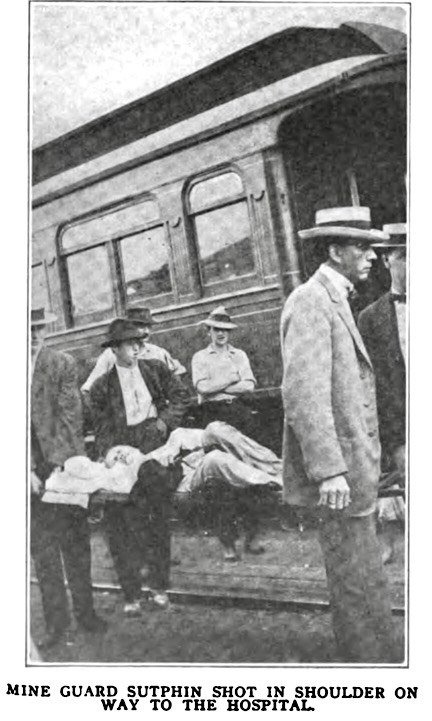 —————
—————
Hellraisers Journal – Wednesday October 2, 1912
“The Battling Miners of West Virginia” by Edward H. Kintzer, Part I
From the International Socialist Review of October 1912:
———-
[Part I of II]
WEST VIRGINIA is living under martial law in the mining war that has been raging in that state for several years. Mother Jones, the veteran of many labor battles, is the central and inspiring figure. In her eightieth year she is today leading the fight in the strike, which started last April. In her characteristic way, she has has more than once defied the military authorities who are making and executing the mine-owner-made laws. When informed that the militia were endeavoring to arrest her for what they called inflammatory speeches, she said:
If they want the chance, I will give it to them. I’d just as soon sleep in a guard house as in a hotel.
At Pratt and Holly Grove Junction guard houses are being filled with miners for the slightest offenses. The militia has taken control, making and executing the laws without regard for the civil code, in all favor to the mine owners, just as have the judicial courts since Capitalism has ruled in the mining industry.
Martial Law Welcomed.
Fierce were the conflicts of 1897 when Eugene V. Debs led the striking miners in the Fairmont district and in 1902, when Mother Jones played a prominent part in that great strike. But never before has any part of the state been under martial law.
When it came it was welcomed by the strikers, for they had suffered such outrages at the hands of a private army in the employ of the coal barons that anything was preferable-even death-to a continuation of the horrors they had perpetrated.
Governor Glasscock appointed a commission to “examine” into the private army system and the wages and working conditions of the miners. The United Mine Workers demanded that the intense over-capitalization of the companies also be considered.
Later the governor issued a proclamation, ordering the mine guards and the strikers to lay down their arms. This was resented by the strikers who claimed that if they obeyed this order the guards would not and they would be helpless before armed thugs. In reply to this proclamation Mother Jones led 10,000 miners to Charleston, where they demanded that the governor order the mine guards out of the region. She declared that he would be to blame for any trouble that might follow if the guards were not sent away. So horrible had been the acts of the guards that the miners were ready to kill on sight.
America has no better example of the conflict between the two important economic classes than this one in the Kanawah coal mining district. Here Capitalism has mocked the sentiment of the founders of the state and by force of a private army abrogated the constitution this new state adopted. Born in the stress of a civil conflict over a question of bondage, the native coal miners of West Virginia have never learned to submit tamely to an interference with their liberties. .
And yet no people have been more thoroughly exploited than the workers of West Virginia. Mine workers that have been on strike since April are desperate over their frightful condition of starvation and disease. Yet every one is loyal and will die rather than submit to the mine guards.
Mine Guards Cause War.
Who are these mine guards? Thugs, assassins, brutes in human guise, traitors, rapists, the lowest form of man. For several years the coal barons of West Virginia have tried to break the union of the miners and prevent further organization by establishing a private armed force of mercenaries. They succeeded only in preventing additional organization, not in crushing what was in existence. Nor could they destroy the solidarity of these fighters. No armament, no guards, nor their unbearable tactics could destroy the spirit of revolt among these miners. It only fanned the flame as was evidenced by the battle at Mucklow.
When forbearance ceased to be a virtue these miners purchased rifles and ammunition. Secretly and openly, too, these arms were acquired. Not worn out and unserviceable guns, but modern rifles that would shoot straight to the aim. Any unusual disturbance, such as the discharge of firearms and cries of distress would be reason for taking these guns from their hiding places, and away these minutemen would march through the night to learn the cause of the uproar.
On the morning of July 25, more than 2,000 miners congregated at Holly Grove. They declared that they could no longer suffer the outrages of the guards. They planned march by stealth up Paint Creek under cover of darkness, going through the brush to Mucklow. Their objective point was the rendezvous of the murderous army. They discovered them in the tipple house, where they had fortified themselves by machine and gatling guns. So close did the miners come to the tipple that they could hear the swearing and commotion over the gambling games. How to get all at once was the question. A quick decision was made. Knowing the force of runaway loaded coal cars, it was planned to release a few that were standing on the incline for the morning’s dump.
Away they were started down the track at a tremendous rate. Above the noise of loud talking came the din of something doing. Their knowledge of surface work at the mines suggested the feat. Hurrying to the switch the track was set to derail the cars. This was done just in time to save the lives of the guards. Out through the side of the tipple shot two loaded cars that left nothing in their wake.
This was the signal for the battle. A few of the mine guards who rushed out to learn the cause of the damage moistened the dusty platform with their blood. Any light was the target for the miners who had gone behind boulders and trees on the hillside where they were comparatively safe while shooting.
All during the night the valley was kept flashing with shooting and roaring of rifles and machine guns. All Friday and Friday night the situation remained the same. More than a dozen men were shot to death and a score or more wounded. What the outcome would have been had not several companies of militia arrived to put an end to the fighting is a matter for conjecture. Despised as are the militia when called for breaking a strike, they were welcomed by the miners. It is said that the battle was started to secure the presence of the militia and the withdrawal of the guards.
Continuing critical situations between miners and mine guards brought the substitution of civil for martial law. The military court is disposing of cases with rapidity that suggests a terrible bias and rancor. The findings by the court in fifteen different cases have been sealed and sent to Governor William E. Glasscock for approval. Glasscock was aspirant for vice-president of the Bull Doze party, one of the “seven little governors” who started the Roosevelt boom.
Will the men get justice from this half-baked faker? No, indeed. He, like the original Bull Dozer, is only a vote catcher. He is playing for political preferment, and since economic and political power are synonymous, he is with the capitalist class who “made” him governor.
What the working class think of Glasscock is exemplified in a resolution in the Socialist Party Convention, adopted at Charleston, within the shadow of the Capitol building, condemning him for being false to his oath of office.
Guards are Responsible.
The strike which started last April is the outcome of the treachery of the coal barons. At the Cleveland joint conference of operators and miners an agreement was reached providing 5.26 per cent advance in wages. When the agreement between the operators and miners of the Kanawha district was made it was based upon an advance of one-half of this wage increase. When the miners arrived for work they were informed that no advance would be granted. A strike followed although the unions had but few of these men as members. There was a solidarity shown that was complete even though no rations were in sight while the strike lasted.
Ask any coal miner in the strike district on Paint and Cabin creeks what caused the feud now in operation, and invariably the reply will be “the mine guards.” Further questioning will bring the statement that “they are the governor’s Bull pups.”
The mine guards go armed with Winchester rifles, and the depredations they practice are intolerable. Recruited by the Baldwin-Felt’s private detective agency of Staunton, Virginia, they are the usual type of men that undertake such damnable work. Most of them have criminal records. They are seasoned for strong arm methods, which are used upon the women. They furnish an illustration of how the capitalists have the workers divided so that they are either gagged by production or starvation, or else employed in opposing the organization and triumph of their class, by serving in private detective and military forces.
The leader of the guards, Ernest Goujot, is a murderer. He was one of a gang that shot to death three women, seven children and twenty men in the West Virginia strike of 1902. He was paroled from the State penitentiary. While killing he was serving the capitalists; therefore they operated the political offices to allow him to escape the law. After having been paroled he joined the Baldwin murdering association, and since the introduction of the guard system he has been working diabolical schemes upon the toilers and their families.
Cruelty of Guards.
On one occasion, while making the rounds of evicting families of miners who refused to work for the company, under conditions no chattel slave owner would hazard upon private property, Goujot and his gang came to Tony Seviller’s cabin. Mrs. Seviller was in bed. She was about to become a mother. Handling her roughly the guards ordered her out. She pleaded to stay. “My God !can’t you see I’m sick? Let me stay until my baby is born.”
“I don’t give a damn,” shouted Ernest Goujot, ordering his men to evict her from the shack of a home.
A short time afterward the baby, condemned to life, saw the light of a day through rents in an improvised tent in which there was no preparation for the stranger’s arrival and no sanitary and medical attention for the mother.
Evictions without notice from places that are dignified by being called shacks has been the cause of much bitter feeling against the guards; particularly for the manner in which the miners’ scant belongings were thrown through windows and doors. Whatever of value could be easily taken away was appropriated by these curs.
Hundreds of families have thus been evicted without statutory requirement, without a moment’s notice to vacate the hovels owned by the mine companies. They are living in tents in the open fields, where the mortality from contagious disease due to having no sewerage and from the burning heat is appalling. Here the women are easy prey for the ravishing guards.
Everything in the mining camps is owned by the mine companies, houses, lands, stores, highways, schools and every approach to these; even the use of the postoffice has been denied the strikers. Where mail is not withheld there is a strict censorship. The mails are opened to learn their contents. Especially are Socialist periodicals withheld from these men.
The use of churches which stand on “company property” are denied the strikers. At Mucklow the guards took advantage of a funeral being held to evict without resistance the bereaved family and friends in attendance at this sad rite. The guards had made the rounds and arrived at the church as the body of Mrs. Robinson was being carried out.
“This church belongs to the company. You won’t have any more funerals here,” a guard shouted.
Returning home these people found their belongings scattered, battered and broken, lying outside of the houses. That night they camped in an open field where they are still living, hoping the guards will be driven away.
To prevent children of miners using a little church for Sunday school the mine guards stationed a machine gun with its forbidding mouth directed toward the door. When the children arrived they became frightened and ran to tell their teacher what they saw. Miss Winfrey came with them to the church.
“Please take the gun away until after Sunday school,” she begged of the guards.
“You folks ain’t got any right to come here,” was the reply. That church has not been used since.
These are but a few instances of the mine guard’s deviltry among the women and children. Others of outrage and rape might be recited but are too shocking in detail to enumerate.
While the two-day battle at Mucklow was raging, additional mine guards were rushed to Holly Grove, where the families of the miners were living in tents. The guards attacked these women and children, driving them into the waters of Paint creek and off into the woods. Thus with the tactic of the savage, they hoped to decoy the men to the defense of their families from their stronghold on the mountainside at Mucklow.
[Emphasis added.]
~~~~~~~~~~~~~~~~~~~~~~~~~
SOURCE & IMAGES
International Socialist Review
(Chicago, Illinois)
-Oct 1912, p295
https://www.marxists.org/history/usa/pubs/isr/v13n04-oct-1912-ISR-gog-ocr.pdf
See also:
The Speeches and Writings of Mother Jones
-ed by Edward M. Steel
University of Pittsburgh Press, 1988
https://books.google.com/books?id=vI-xAAAAIAAJ
Note: Mother Jones made several speeches in WV during Aug & Sept of 1912. Speeches can be read here, beginning with that of Aug 1st:
-page 88 (110 of 360)
https://digital.library.pitt.edu/islandora/object/pitt%3A31735035254105/viewer#page/78/mode/2up
Note: we have a stenographer, hired by the coal operators, to thank for the text of Mother’s speeches delivered in West Virginia during August and September of 1912. See Steel, page 57.
“The Coal Miners’ Strike of 1897” by J. E. George
Source: The Quarterly Journal of Economics , Jan., 1898, Vol. 12, No. 2 (Jan., 1898), p186-208
https://www.jstor.org/stable/pdf/1882118.pdf
July 26, 1897, Wheeling WV, Eugene Debs, Speech on the Coal Mining Strike
https://www.marxists.org/archive/debs/works/1897/970726-debs-speechatwheeling.pdf
Tag: West Virginia Coalfield Strike of 1902-1903
https://weneverforget.org/tag/west-virginia-coalfield-strike-of-1902-1903/
Report of West Virginia Mining Investigation Commission
Appointed by Governor Glasscock on 28th Day of August, 1912
https://babel.hathitrust.org/cgi/pt?id=njp.32101058831577&view=2up&seq=4
Conditions in the Paint Creek district, West Virginia.
Hearings before a subcommittee of the Committee on Education and Labor, United States Senate, Sixty-third Congress, first session, pursuant to S. res. 37, a resolution authorizing the appointment of a committee to make an investigation of conditions in the Paint Creek district, West Virginia [June 2-Oct. 29, 1913]
Volume 1
https://babel.hathitrust.org/cgi/pt?id=nyp.33433004194795&view=2up&seq=11
Volumes 2 & 3:
https://babel.hathitrust.org/cgi/pt?id=nyp.33433004194787&view=2up&seq=7
Note: search above volumes: evictions; martial law; mine guards; gaujot; seville; mucklow.
Tag: Paint Creek-Cabin Creek Strike of 1912-1913
https://weneverforget.org/tag/paint-creek-cabin-creek-strike-of-1912-1913/
~~~~~~~~~~~~~~~~~~~~~~~~~
There Is Power in a Union · Street Dogs

